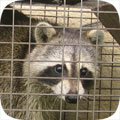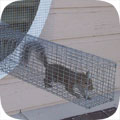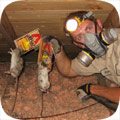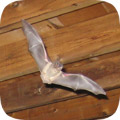- holland@wildlifeanimalcontrol.com
Call 24/7 for a free quote:
616-394-5313 or 269-692-9416
Holland Wildlife Animal Control
Professional Wildlife Removal Company Servicing Holland, MI
If you have a problem with wildlife in your Holland home, your best option is to hire a company that specializes in Michigan wildlife removal only. This is a specialty business, and regular pest control companies do not use the proper techniques to solve animal problems. I have spent many years reviewing Michigan and Holland, and I recommend the following:
Lakeshore Wildlife Removal
Cell Phone: 616-394-5313 or 269-692-9416
NOTE: If you have a dog or cat problem, call Ottawa County Animal Services: 800-249-0911

Lakeshore Wildlife Removal specializes primarily in removing animals from attics of homes and buildings - this includes squirrels in attics, raccoons, and rats or mice in homes. Michigan also has a documented problem with
bats in buildings, and Lakeshore Wildlife Removal is specially trained in bat removal. They also perform general wildlife trapping services, such as the capture and removal of skunks or opossums on the
property. Call 616-394-5313 or 269-692-9416 to discuss your critter problem and schedule a same-day or next-day appointment. Click here to learn more about what prices we charge in 2020.
When hiring a company to solve your wild animal problem, you want these features:
- Specializes in wildlife removal, not pest control
- Fully Michigan and Ottawa County licensed and insured
- Works 7 days per week (critters don't take weekends off)
- Performs full building inspections: enters and inspects attic
- Performs exclusion repairs, with guarantee against animal re-entry
- Offers cleanup of biohazardous wildlife waste
Lakeshore Wildlife Removal is a full-service Holland wildlife removal company. This is very different from a regular Holland pest control company. The pest control companies spray poison to kill insects. This is not at all
similar to wildlife removal. Lakeshore Wildlife Removal performs a full inspection of the home or property, and determines why the animal(s) are there, and if inside a building, how the animals got inside. All
animals (including rodents) are trapped and removed, or if possible, removed from the building using special exclusion devices. Once the animals are gone, preventative repairs are essential, and
cleanup is sometimes recommended.
 Holland wildlife trapping - it's not as simple as it may seem. It's illegal in Michigan to trap without a license. Trap type is very important and there are many different types, bait is somewhat relevant, trap placement
is vital, and there are dozens of small things that are very important to know.
Safety is a concern. Then once the animal is trapped, it must be removed and dealt with in the proper manner according to Michigan law. We offer Holland raccoon removal. Read more about how to get rid of raccoons.
Holland wildlife trapping - it's not as simple as it may seem. It's illegal in Michigan to trap without a license. Trap type is very important and there are many different types, bait is somewhat relevant, trap placement
is vital, and there are dozens of small things that are very important to know.
Safety is a concern. Then once the animal is trapped, it must be removed and dealt with in the proper manner according to Michigan law. We offer Holland raccoon removal. Read more about how to get rid of raccoons.
 Animals in attics - this is our specialty at Lakeshore Wildlife Removal. Many types of animals like to live in attics. This includes squirrels, raccoons, rats, mice, bats, birds, and even possums. Critters like to go into attics for a safe place to live
and raise their young. Removing animals from attics is very complex work, partly because of the presence of baby animals. If you need Holland squirrel removal, we can remove all the squirrels from your attic, and seal out any future ones. Read more about how to get rid of squirrels.
Animals in attics - this is our specialty at Lakeshore Wildlife Removal. Many types of animals like to live in attics. This includes squirrels, raccoons, rats, mice, bats, birds, and even possums. Critters like to go into attics for a safe place to live
and raise their young. Removing animals from attics is very complex work, partly because of the presence of baby animals. If you need Holland squirrel removal, we can remove all the squirrels from your attic, and seal out any future ones. Read more about how to get rid of squirrels.
 Rodent control must be done in a very specific way. First off, the most important thing is that all the openings that rats and mice can use to enter a house be sealed. Then all the rodents must be physically trapped and removed.
Never, ever use poison! Most Holland exterminators will just use this lazy poison technique to kill rodents, and it causes more harm than good - dead stinky rats, and it doesn't solve the problem. Call us for correct Holland rat removal. Read more about how to get rid of rats.
Rodent control must be done in a very specific way. First off, the most important thing is that all the openings that rats and mice can use to enter a house be sealed. Then all the rodents must be physically trapped and removed.
Never, ever use poison! Most Holland exterminators will just use this lazy poison technique to kill rodents, and it causes more harm than good - dead stinky rats, and it doesn't solve the problem. Call us for correct Holland rat removal. Read more about how to get rid of rats.
 Bat removal is a highly specialized task. Michigan is known to have colonizing bats who often live in buildings. Bats love attics. If not removed, the colony can grow to a very large size over the years. The bat droppings are often corrosive and
cause health risks. The same goes for bird droppings on or in buildings. We perform Holland pigeon removal and bird control. But our specialty is Holland bat removal. We remove 100% of the bat colony and seal the building so that it's totally bat-proof. Read more about how to get rid of bats.
Bat removal is a highly specialized task. Michigan is known to have colonizing bats who often live in buildings. Bats love attics. If not removed, the colony can grow to a very large size over the years. The bat droppings are often corrosive and
cause health risks. The same goes for bird droppings on or in buildings. We perform Holland pigeon removal and bird control. But our specialty is Holland bat removal. We remove 100% of the bat colony and seal the building so that it's totally bat-proof. Read more about how to get rid of bats.
 If you have animals inside a house, no job is complete without proper exclusion repairs. If you simply hire a Holland trapper who only removes the critters, then the problem will return. You need to hire a Holland wildlife control company that identifies 100% of the animal entry points
into your building, and seals them shut with professional repairs. In addition, in many cases animals have left waste or contamination behind, and you'll want a company that can provide professional cleaning services. Lakeshore Wildlife Removal does both.
If you have animals inside a house, no job is complete without proper exclusion repairs. If you simply hire a Holland trapper who only removes the critters, then the problem will return. You need to hire a Holland wildlife control company that identifies 100% of the animal entry points
into your building, and seals them shut with professional repairs. In addition, in many cases animals have left waste or contamination behind, and you'll want a company that can provide professional cleaning services. Lakeshore Wildlife Removal does both.
The above are just some of the services offered by Lakeshore Wildlife Removal. We also trap and remove animals that destroy lawns, such as moles, or digging animals. Sometimes animals like opossums will live under buildings, steal pet food, raid garbage cans, etc.
Read about how to get rid of opossums. Skunks commonly live under sheds or decks, and set up a den. We can trap and remove them without them spraying. Read about how to get rid of skunks. Lakeshore Wildlife Removal
also provides dead animal removal in Holland. If you need help with any other wildlife conflict, from a fox, beaver, groundhog, or any other critter, we can solve it. We also do Holland snake removal - most of the snakes in Michigan are not venomous, but
call us if you want safe removal, or read about how to get rid of snakes in Holland. And remember, we are a private business, not Ottawa County Animal Control Services, so if you have a dog or cat problem, call the County at 800-249-0911.
Ottawa County animal services does not handle any wildlife issues.
Lakeshore Wildlife Removal: 616-394-5313 or 269-692-9416
Holland Pricing Info For Year 2020
 Every wildlife removal situation is different, from the species of animals involved, the location of the animal inside a house or outside, the extent of repairs or cleanup, etc. It's impossible to give one-size-fits-all prices. Examples MIGHT include:
Every wildlife removal situation is different, from the species of animals involved, the location of the animal inside a house or outside, the extent of repairs or cleanup, etc. It's impossible to give one-size-fits-all prices. Examples MIGHT include:
Small Job: For example, a one-stop job to remove an animal in the yard: $100 on up
Medium Job: For example, getting critters out of your house with minor repairs: $300 on up
Large Job: For example, a project involving many service trips and complex work: $500 on up
Give us a phone call now and tell us about your wildlife issue and we will be able to give you a price estimate over the phone. If you're cool with it, we can schedule a same-day or next-day appointment if you like. Our prices are fair, and a good value because we do the job right, the first time.
Holland Wildlife Tip #1:
What to do with caught skunk - If you catch a skunk, you need to be prepared to take care of the animal afterward. This means you have to have a plan. The skunk is either going to be relocated at least five miles away, or you're going to humanely kill it. What to do with a caught skunk is one of the reasons people hire a wildlife removal company instead of handling the situation on their own. A wildlife expert will come in and trap the animal. They will then relocate it or humanely euthanize it. This is usually much more than the average homeowner is prepared to do. If you have an area to relocate the skunk at least five miles away with ample shelter and water, all you need to focus on is proper trapping technique. To trap the skunk, you can use a traditional cage trap. These can be purchased in most farm stores. Set the trap on level ground near the areas where you have seen the skunk or noticed skunk activity. Bait the trap with marshmallows or cat food.
Holland Wildlife Tip #2:
County animal services for feral cats - Feral cats are one of those nuisance animals that are the complete result of human negligence. There are so many feral cats now that managing the population is almost impossible. For this reason, most law enforcement agencies will not bother with cat issues, only dog issues. Cats are much harder to catch and rarely pose a threat to humans from attacks. If you are looking for help with a feral cat issue in the county, you may have to look to yourself first before any agencies will help you. If you care about the feral cats and want to see them off the streets, catching them in cage traps can be an effective way to transport them to a local shelter. This will be time consuming for a large population, but it can be done. If the feral cats are bothering you and your own pets, you need to look at property control to keep them away. Make sure that all garbage and pet food is stored inside the building where the ferals cannot smell it nor get near it. Feeding stray cats can be the worst thing to do if you don't want them on your property. Along these same guidelines, keep all areas like porches and sheds well-sealed to prevent cats from using the structures for shelter.
Michigan Wildlife Information:
Michigan State bird: American robin
State mammal: White-tailed deer
State reptile: Painted turtle
State fish: Brook trout
Michigan is a state that tends to get bombarded with snow and storms due to its location in the arms of the Great Lakes. The state is also relatively flat, though it has a nice mix of grassland and forest and some moderate hills. Pine trees are numerous in this part of the country, and they provide shelter for the plentiful animals that must survive a long, cold winter. Most of the state experiences a short, warm summer, but it is often filled with storms coming in off the bordering lakes. Due to the long winters and the cooler overall temperatures, most of the animals in this state are ones that are comfortable surviving in poor conditions when food is covered by feet of snow.
Michigan is densely populated in the regions along the Great Lakes, but it offers a fair share of wilderness areas as well. In these sparsely populated zones you will find large grazing animals like elk, mule deer, and white-tailed deer. These herbivores ultimately draw in predators like cougars, wolves, coyotes, and bears. It's not common for bears to prey on the young of large grazers, but if food is scarce the bears can be agile, dangerous hunters. Such large creatures are not usually the concern of homeowners, even those in rural settings. Wolves and coyotes can be dangerous during seasons when food is limited. Some coyotes will adapt to urban settings. These canines are considered significantly more dangerous than coyotes in the wild. An urban coyote will not hesitate to scale a fence with the purpose of attacking a house pet.
Large animals, though they can be pests, are not as troublesome as smaller creatures like raccoons and skunks. There are a number of animals that will invade a home. Raccoons, opossums, squirrels, rats, and mice are the most frequent offenders. In Michigan, there are also Indiana bats. These small bats are very rare and disturbing one of their roosts-even if it's in your own home-is illegal.
Aquatic animals are also found in this state. River otters are very common, along with beavers and muskrats. Michigan has the water shrew, too, a large semi-aquatic rodent that is active at night near streams and lakes, and only has a lifespan of about 18 months.
You can always call Lakeshore Wildlife Removal, any time of day, at 616-394-5313 or 269-692-9416, for a price quote for Holland wildlife control services. I am confident that this is the best choice amongst wildlife removal companies in Holland, MI.





































